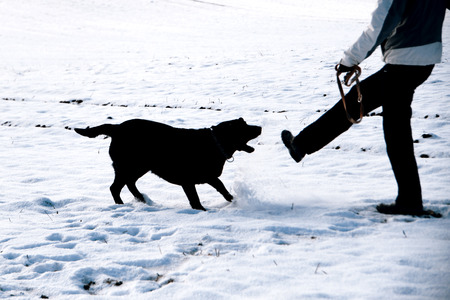Posts Tagged ‘M.G.L. c.140 § 155’
Massachusetts Lawmakers Consider Bill to Prevent Insurance Companies from Dog Breed Discrimination
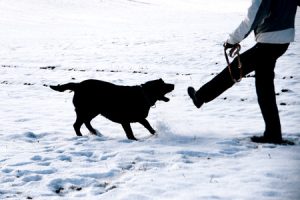
Massachusetts lawmakers are considering a bill to prevent insurance companies from discriminating against homeowners who own certain dog breeds.
Massachusetts lawmakers are considering a bill to prevent insurance companies from discriminating against homeowners based on their dog’s breed.
Rep. Jack M. Lewis (D-Framingham) is the sponsor of H.554, which would ensure dog owners can buy insurance to provide compensation to anyone injured by their pet.
Under the proposed bill, insurance companies would not be allowed to refuse to offer homeowners insurance or renters insurance coverage based on the specific breed of an individual’s dog. The insurer would be prohibited from refusing to issue a policy, renewing a policy, canceling a policy or raising the premium based on the dog’s breed.
The bill provides an exception for a dog which has been designated a “dangerous dog,” by a local community.
At Breakstone, White & Gluck, our attorneys have represented victims of Massachusetts dog bite attacks for more than 30 years. Massachusetts has a strict law when it comes to dog bites. Under M.G.L. c.140 § 155, a dog owner or keeper is strictly liable for injuries inflicted by a dog. Their homeowners insurance policy typically provides compensation to the victim. With the exception of young children, victims have to show they were not teasing or tormenting a dog or trespassing.
Years ago, the cities of Boston, Lowell and Worcester banned certain breeds of dogs, such as pit bills, because they had a reputation for being dangerous. This practice became illegal in Massachusetts in 2012, with passage of St.2012, c.193. Here is a summary of the animal control law written by the Massachusetts Society for Prevention of Cruelty for Animals (MSPCA).
Yet certain insurance companies are still asking about dog breeds. At the State House this week, a representative from the Property and Casualty Insurers Association of America said dogs are the industry’s “single biggest loss.” He was testifying before the Joint Committee on Financial Services.
Meanwhile, the MSPCA supports the Massachusetts bill, saying breed-specific policies are a bad idea. The organization says a better solution is educating the public and dog owners on dog behaviors.
The MSPCA estimates 4.7 million dog bite injuries occur in the U.S. each year, with 800,000 victims requiring medical treatment.
At Breakstone, White & Gluck, we support full compensation for anyone who has been injured by a dog. Young children often suffer dog bite injuries. But others are also at risk. Over the years, our dog bite attorneys have represented clients of all ages who have been bitten suddenly and without warning – including cyclists riding bikes. We have represented clients in the Boston area and across Massachusetts. When a dog bites, medical care is critical – in the hours, days and months following an attack.
This medical care comes with other costs. Victims – or family members – may have to take time off from work to receive medical care and deal with the emotional pain and stress of a dog bite attack. Our attorneys have represented those injured by dogs as well as family members who witnessed the terrifying attack and suffered severe emotional distress as a result. It is a long journey back after a dog bite injury and it’s important for insurance companies to provide compensation.
Our Work for Dog Bite Victims
Read about our results for clients injured by dog bite attacks in Massachusetts.
About Breakstone, White & Gluck
With over 100 years combined experience, Breakstone, White & Gluck specializes in representing those who have been injured by the negligence and wrongdoing of others in Massachusetts. We are experts in handling dog bite and animal attack cases. If you have been injured, learn your rights. For a free legal consultation, contact us at 800-379-1244 or 617-723-7676 or use our contact form.
Attorney David White Discusses Massachusetts Dog Bite Law Following Mansfield Dog Attack
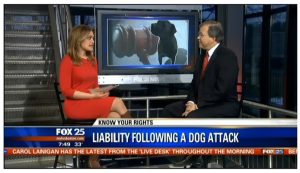
The law is “very cut and dry,” when it comes to liability for Massachusetts dog bite cases, attorney David White told Fox-TV Boston recently.
White, a partner at Breakstone, White & Gluck of Boston, spoke on the network’s morning program about Milo, the Mansfield dog which attacked and seriously injured a 6-year-old boy on Jan. 3. The boy suffered severe facial lacerations and required more than 400 stitches. Last week, the Mansfield Board of Selectmen held a hearing and voted 3-2 to euthanize the dog. The dog’s owners said they planned to appeal the vote in District Court and were allowed to take Milo home after the hearing. Then, the dog attacked again, this time over the weekend on West Street in Mansfield, and ended up being euthanized before any appeal. In the second attack, the dog bit a 16-year-old teenager, who was sent to Hasbro Children’s Hospital to be treated for injuries. See news coverage.
In the TV interview, White explained the process in Massachusetts for protecting communities from dangerous dogs. When someone is injured after a dog bite, the incident is reported to a local animal control officer, police or the Board of Selectmen. The board holds a hearing to determine if the dog is dangerous. It then votes on appropriate action, which may include muzzling the dog, restraining it, ordering it to leave town or other steps.The dog owner is allowed to appeal in the District Court.
When someone is injured by a dog in Massachusetts, they can also file a lawsuit in civil court to recover damages under M.G.L. c. 140, Sec. 155.
White said the law holds dog owners strictly liable for dog attacks, only providing a few exceptions. They include if an injured person is tormenting a dog or trespassing on another person’s property. Some states have a “one bite” or “first bite” rule, but not Massachusetts.
“The law is very cut and dry,” White told Fox. “And furthermore if there is an injury to a child under the age of 7, there is a presumption the child was not teasing or tormenting the dog.”
When someone is injured, they are not required to prove the dog has injured before or that the dog is vicious.
White advised dog owners to make sure they have coverage for dog bites and attacks on their homeowner’s insurance policies. If your insurer does not provide coverage, he says find another provider who does.
Approximately 4.5 million people are bitten by dogs each year in the United States, according to the U.S. Centers for Disease Control and Prevention.
Children are the most frequent victims, with those ages five to nine accounting for the largest numbers of injuries.
Dog Attacks: Pit Bull Ordinances Nullified Under New State Law
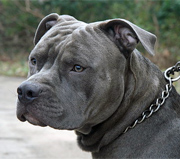 State lawmakers have handed cities and towns with pit bull ordinances a set back after passing a new animal control law which says no regulation may be specific to breed.
State lawmakers have handed cities and towns with pit bull ordinances a set back after passing a new animal control law which says no regulation may be specific to breed.
Boston, Lowell and Worcester are among the Massachusetts communities which have implemented pit bull ordinances in the past 10 years. None of the communities will be grandfathered under the legislation, “An Act Further Regulating Animal Control.” Gov. Deval Patrick signed the bill into law Aug. 2 and it takes effect Oct. 31.
Boston enacted its pit bull ordinance in 2004 and it serves as the model for many other local communities seeking to reduce dog bites and attacks. The ordinance states dogs must be muzzled outside the owner’s private home, apartment and car. All dogs in Boston are required to be leashed off their owner’s property.
Under the pit bull ordinance, the owner must post a sign alerting the public and guests that there is a pit bull on the premises. Additionally, a dog owner may not register or keep more than two pit bulls.
If the pit bull owner is renting an apartment, the landlord must sign off written permission, which must then be presented to the city’s Animal Control Officer.
Worcester and Lowell have similar ordinances to prevent dog bites and attacks, but they also require pit bulls be spayed and neutered. Lowell’s ordinance began in July 2011, according to the Lowell Sun. Local law enforcement is still assessing the impact. But one visible change is more pit bull owners are registering their animals with the city. In the last six months of 2011, 30 pit bulls were registered with the city, according to the city clerk. In 2012, 56 pit bulls have been registered.
Worcester officials report the opposite since their ordinance took effect on April 1, 2011, according to the Telegram & Gazette. The Worcester city clerk’s office reports in 2012, there were 221 licensed pit bulls in the city and an estimated 275 unlicensed. The number of registered pit bulls now stands at fewer than 70.
The city is still awaiting figures on recent dog attacks. But it implemented the law after a surge in dog attacks and figures which showed more than half involved pit bull attacks.
From Sept. 30, 2008 to Sept. 30, 2009, the city received 55 complaints of dog attacks or fear of a dog attack; 29 involved pit bulls. Police department figures further showed pit bulls were involved in 25 percent of the city’s dog bites over a two-year period.
The new state law also includes other changes to animal control regulations, including providing standards for how police chiefs handle dogs deemed dangerous and establishes a Homeless Animal Prevention and Care Fund, which will be funded by voluntary donations on state tax returns.
Related:
Worcester pit bull regulations nullified, Telegram & Gazette.
New state law could maul Lowell’s pit-bull ordinance, Lowell Sun.
Bill S.2192, An Act further regulating animal control.
Read More
Dog Bites and Dog Attacks Can Be Prevented
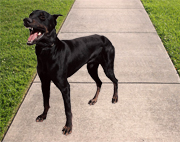 With the return of the warm weather, many dogs are back outside with their owners in our neighborhoods, parks and yards.
With the return of the warm weather, many dogs are back outside with their owners in our neighborhoods, parks and yards.
This is the time of year dog bites often occur, as dogs encounter unfamiliar people and environments. Dog bite injuries can result when dogs are not properly trained, do not receive the right care and are not prepared for social interaction.
May 20 to May 26 is National Dog Bite Prevention Week, hosted by the American Veterinary Medical Association (AVMA). One of the organization’s messages is that dog bites and dog attacks are preventable if owners take the right steps to train their pets.
Children are the most frequent dog bite injury victims. Of 800,000 Americans who receive medical attention for dog bites each year, approximately half are children. In 50 percent of dog bite cases involving children, the dog responsible belongs to a neighbor.
Senior citizens are the second most common dog bite victims. On the job, more than 5,600 postal workers are attacked by dogs each year.
If you own a dog or plan to obtain one, you have a responsibility to practice safe ownership and protect others from dog bites and dog attacks. Our Boston dog bite lawyers offer you these safety tips:
- Make sure your dog is licensed and has received all of its vaccinations. These are your most basic responsibilities.
- Always use a leash when walking your dog. This is a courtesy to other people you encounter and helps protect everyone.
- Select your dog carefully and take time to research the breed. If it is a puppy, ask to meet the parent dogs. Never obtain a dog on impulse.
- Make sure your dog is always wearing its tags with appropriate identification information.
- Ask your veterinarian if they suggest a dog training school. If you choose to use one, do your research. Seek out references online and ask the dog school owner for client names.
- Train your dog to know basic commands such as “sit,” “stay,” and other actions. This builds a bond of trust between your dog and people
- Ask your veterinarian or dog trainer whether crate training may be appropriate
- Make sure your dog has opportunity for healthy interaction with other people and animals as a puppy. According to the AMVA, the first 6 to 14 weeks are critical to a puppy’s social development. The challenge is this is the time when a puppy is most vulnerable to illness so it is important to work with your veterinarian.
- Do not put your dog in a position where it feels threatened or teased.
- Make your home a safe environment for yourself, your dog, guests and neighbors. Consider fencing your yard. Make sure you have a door partition and a crate. Also make sure there are not any door or window openings which allow your dog to exit your home on its own.
- Your dog needs physical exercise and mental stimulation. Make time in your schedule to regularly walk and exercise your dog.
- Dogs can become bored and potentially destructive when left alone for many hours at a time. If yours is left alone all week, consider dog walking or daycare services for parts of the week.
- Avoid high-excitement games with your dog, such as wrestling.
- If your dog is showing signs of aggression, talk to your veterinarian and a dog trainer. If your dog bites or attacks someone, the injuries may be severe and long-term. You may also be held liable and have to pay damages.
Massachusetts Cities and Towns Need Strong Dangerous Dog Laws and Fines
A Lowell dog attack last week highlighted the need for communities to adopt strong dangerous dog laws and properly enforce them.
Last December, the Lowell City Council passed an ordinance defining a dangerous or vicious dog as one that has attempted a dog bite or dog attack on a person, has a tendency to threaten the safety of domestic animals or is involved in dog fighting, drug trafficking or gang activity.
Once a dog is deemed dangerous, its owner has to obey certain conditions to protect public safety. First, the dog must be kept indoors or in a locked pen. A sign must be posted warning the public that a dangerous dog resides on the property. If the dog is taken off the property, it must be muzzled and kept on a leash no more than 4-feet long. The dog’s owner must also hold $100,000 in liability insurance.
Dog owners found to be in violation are subject to fines up to $300. The real muscle behind the ordinance is each day of non-compliance is considered a separate offense.
“I have been called upon to represent children whose bodies have been disfigured by vicious attacks from dogs,” said Boston personal injury attorney Ron Gluck of Breakstone, White & Gluck. “In several of the cases, towns had leash laws that were violated by the dog owners. These violations by the dog owners were the direct cause of the serious injuries which will affect these children for the rest of their lives. The stronger the penalties for each violation, the safer children will be.”
Lowell also has a “potentially dangerous” dogs ordinance, which seeks to stop dogs who show aggressive behavior before an attack.
In the case of last week’s attack, David Spaulding was attacked by his own two 16-month-old pit bulls, Venom and Rampage. A neighbor broke down the padlocked fence to Spaulding’s backyard and threw pickets from the fence at the dogs.They eventually ran off and Spaulding was taken to the hospital with injuries to his head, arms and torso. The dogs were immediately euthanized.
The Boston law firm of Breakstone, White & Gluck is experienced at handling pit bull attack cases and typically sees cases of dogs attacking neighbors and children, not homeowners themselves. There are red flags about this attack that we don’t have enough information to address – including a newspaper report that the dogs had been involved in a previous attack of a puppy.
But the Boston lawyers at Breakstone, White & Gluck believe if properly enforced, Lowell’s dangerous dogs ordinance has the teeth to protect the public.
Read about a proposed Andover pit bull ban.
Massachusetts Appeals Court Allows Dog Bite Case Against Landlord to Proceed
The Massachusetts Appeals Court has allowed the claim of a child who was bitten by a dog to proceed to trial against the landlords, even though the landlords did not own the dog. The ruling reverses a lower court ruling in favor of the landlord.
The plaintiff was ten years old when he was attacked by a pit bull named Tiny. Tiny belonged to another tenant in the same 4-family building. Tiny had been found in the woods and adopted by the family. Tiny had demonstrated some aggressive behavior prior to the date of the incident. The plaintiff’s family maintained that they had lodged multiple complaints with the landlords about not just the presence of the dog, but also its aggressive behavior. The landlords were also informed that Tiny was allowed to roam unrestrained, a violation of the Waltham leash law. The landlords claimed they had no knowledge that the dog might be dangerous.
The landlords had a no-dog policy for the premises, but failed to enforce that policy with regard to Tiny. In fact, the plaintiff’s family had previously given up its dogs because of the landlords’ policy.
On the date of the incident, Tiny was sitting on a porch, unrestrained, then ran across the yard, jumped a fence, and bit the plaintiff who was playing in the neighbor’s yard. The ten-year old had mulitiple dog bite injuries to his leg.
The Superior Court judge ruled that the landlords were not negligent, and that the fears of the pit bull were “subjective.” The Appeals Court disagreed.
In Massachusetts, a third party such as a landlord, is not liable under the Massachusetts strict liability statute governing dogs. While a dogs owner or keeper is strictly liable for injuries caused by their dog, a third party can be liable only if he or she is negligent. A landlord does not insure that the property will be safe, and has a duty to use reasonable care for the premises. Thus, in this case, the plaintiff is required to prove that the landlord knew or should have known of the dangers of the dog. The landlords could not be held liable just on the fact that the dog was of a dangerous breed, but could be held liable if they had knowledge of its dangerous behavior.
The Appeals Court also noted that negligence cases are ordinarily best left to a jury’s consideration, since the cases often turn on disputed facts. Given the disputed facts in this case, namely whether the landlord had received reports of the dog’s dangerous behavior, the case was sent back to the Superior Court for trial.
The name of the case is Nutt v. Florio, Appeals Court No. 08-P-81 (October 19, 2009).


